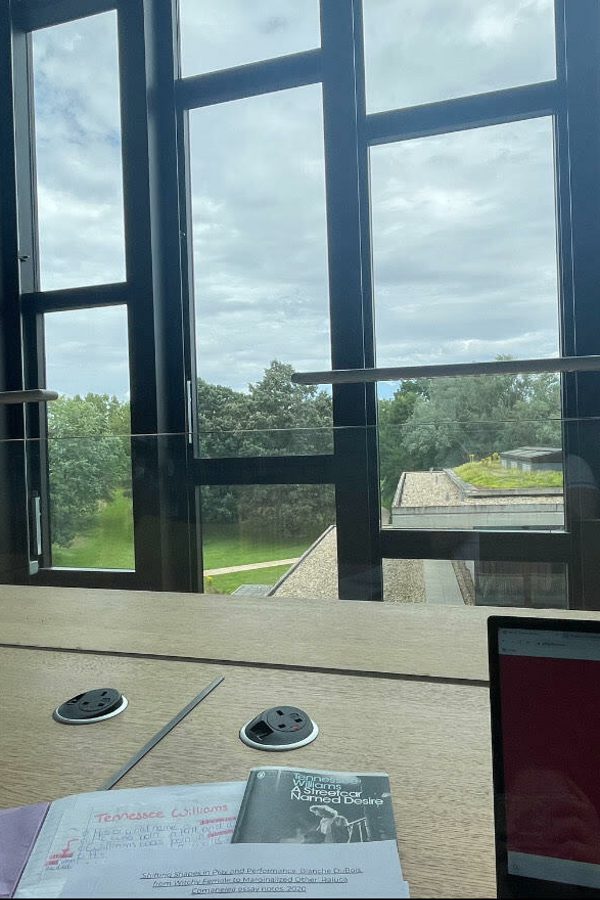
Personal Statements, Pastimes and Practice Papers: A Survival Guide to Year 13

By Evie Croll – 2nd July 2024
The wonderful Evie Croll has written us a fantastic blog about not just surviving Year 13 - but smashing it. She briefs us on how to smash your A-Levels, taking a much-needed break, and how to do a UCAS application - from work with her Zero Gravity mentor to using the Zero Gravity community space.
As a Year 12, I found Year 13 quite daunting, especially from the horrible reputation I discovered that it had all over TikTok. However, it doesn’t have to be. As a Cambridge University offer-holder (and A-Level survivor) I want to help any Year 12 to prepare for your final year of A-Levels through simple, easy steps.
1. Remember to relax
The whole point of a six-week summer is to spend time doing things you have enjoyed. I found that I had a similar workload in Year 12 as I did in Year 13. So, give yourself credit! Now is the time for lay ins, relaxing and picking up hobbies that you enjoy.
Quality of revision is always better than quantity. I often found taking a proper break (not just scrolling on my phone in between study sessions) meant I was actually able to reenergise, so even if you feel that you have a lot of work to do, make sure you take at least a few weeks off in order to rest and appreciate the hard work you have put into your first year of A-Levels.
If, like me, you struggle to know HOW to relax, you could make a jar of all the activities you have thought ‘I wish I was able to go to …. and do ….’ whilst studying away, and things that break up your day. A big priority for me this summer is to get out of the house at least once a day, with things like charity shopping, going for a run, meeting friends, baking or playing an instrument allowing me to stay out of a procrastinating trap.
2. Preparing for A-Levels
Along with having a break, many of you will probably want to keep up some studying in this big chunk of time that is the summer holiday. I would definitely recommend making some revision material based off of all the topics you have studied in Year 12. Maybe you were so busy that some topics became neglected, or you realised that having flashcards on the structure of certain questions and previous feedback from teachers would be important, and this is something you might not have time to fit in during Year 13.
I used Quizlet religiously for creating knowledge flashcards, since the Card Sorting and Memory Score features meant I could go over knowledge that I had gotten wrong, and keep track of which sets I knew the least. Another great app with a similar premise for this is Anki.
You could try to make this more enjoyable by going out to a local or university library, and getting a coffee or meal out. This means you can be productive whilst changing up your environment, and preparing for your next year at sixth form / college.
3. Preparing to apply to university
If you are thinking of applying to university, your summer is a great opportunity to do some research and draft a personal statement. Applying to Cambridge meant I had to submit my UCAS application by October 16th, which I actually found to be a blessing in disguise. Whilst my friends were stressed in the midst of mocks, coursework AND a university application, I had completed mine months before, giving me more time to focus on my A-Levels (if you ignore the admissions test and interviews…)
The first thing I would do is create a UCAS account, using your personal email. This allows you to understand what parts of the application will need to be completed, and give you access to the UCAS search tool, in which you can search and favourite courses that you are interested in.
Tip: make sure you search if there are any admissions tests necessary for the courses you apply to, and that you know when it has to be taken, and therefore how much you might need to prepare for this.
Since the personal statement is arguably the lengthiest part of your application, I would DEFINITELY get a head-start in the summer. With my Zero Gravity mentor Heidi, I was able to compile the opportunities that I had done (and was still doing), and create a plan of synthesising it into a comprehensive journey of my activities (and finding out if you are really lacking in discovery into your topic). Me and fellow Zero Gravity member Louise C have made a humanities personal statement resource for any university, along with Oxbridge specific advice to help understand how to structure your statement here.
Since university is expensive and competitive to apply for, it is great to spend some time in the summer deciding, and visiting open days (most universities also have open days in September if you have missed out). I found giving myself the time to leave my personal statement draft for a week or two and to come back with a fresh mind freed me from the trap of assuming the admissions tutor can understand your thought process - in my last check of my personal statement I realised I had accidentally removed the name of a novel, being unaware it wasn’t there since in my head I knew what I was talking about…
And to sum it all up:
The main points I hope you can take away from this is:
RELAX
Think of gaps in knowledge or revision you feel you wouldn’t have time to make up in year 13 and begin it now
Begin to do activities for your personal statement and compile them, with help from mine and Louise’s doc
This blog contains everything I did (and wish I did) in Year 13. For many sixth formers, this is the last time you will see people you have known for 7 years, so try to make the most of your summer, allowing you to enjoy and appreciate the subjects you have taken for A-Levels! Even if you don’t manage to do everything you hope in the summer, there is still lots of time and this is by no means a make or break guide to applying to university.
Enjoy your summer!
Fantastic stuff, Evie, cheers for writing that out! If you have any more questions about how to apply for university or how to survive Year 12, be sure to get into the Zero Gravity community, where you can ask our online student community made up of thousands of bright and brilliant members for their advice. Or, you can apply for a Zero Gravity mentor yourself, to receive expert and personalised help with your UCAS application.















